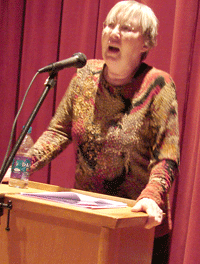GROSSE POINTE WOODS — Taking a foreign language class is a requirement at many high schools and colleges across the country, but for most students, the options are limited.

|
|
Karin Ryding |
But if trends continue, Arabic might soon be taught in more classrooms across the country according to Karin Ryding, former professor of Arabic Language and Linguistics at Georgetown University. Ryding gave a speech at her high school alma mater, University Liggett School in Grosse Pointe Woods, on Thursday, April 2.
“There is a big movement for K-12 Arabic teaching,” she said. “We have a crisis of foreign language proficiency in this country. The U.S. is becoming a language cemetery.”
Ryding said that the U.S. Defense Department is making strong efforts to teach more Arabic, but the quality of instruction is low. Simply placing a native speaker in front of a class doesn’t ensure good instruction no matter how proficient that person may be.
In addition, Arabic is considered to be a level three language by the United States. Level three is considered the highest level of difficulty for learning a foreign language, a position Arabic shares with the Asian trio of Japanese, Chinese and Korean.
Making matters even more difficult according to Ryding is that the spoken and written forms of Arabic are different and that there are many different dialects of spoken Arabic across the Arab world. The script writing style of Arabic also takes some time for people to wrap their heads around as well.
“For a beginning student, the script style looks impossible,” said Ryding. “But once they learn script it’s much easier to figure out.”
When beginning an Arabic language program, students are encouraged to learn one specific dialect as a base. The U.S. Defense Department often teaches Egyptian because it is where many study abroad programs are based out of, but Ryding recommends Jordanian as a good starting point.
University Liggett Assistant Head of School Catherine Rogg said that the small private school, which features a diverse student body, will look into adding different types of languages in the future.
“We plan on bringing Chinese to the school next year as we focus on a more global curriculum,” she said.
“Karin has opened my eyes clearly to the importance and value of language.”
There are no plans to add Arabic but Trey Cassidy, the head of the upper school, said that he would like to see more Arab representation at the school in the future.
“I know the Arab community values education, and diversity is important to us,” he said, adding that he’d like to see more students enroll in the school.
Ryding would like to see the same increase in terms of Arabic speakers across the country. Already, there are positive signs, as college enrollment in Arabic has risen almost 130 percent since 2002, and the surge has Arabic among the top ten most studied languages in the United States for the first time ever.
But Ryding, who has been elected to the executive council of the Modern Languages Association, the world’s largest professional association for language and literature professionals, acknowledges the language still has a long way to go to meet the needs of the country. The U.S. still relies on outside sources for translation services in most cases, for example.
“Arabic has gone global, and it will be vital to the United States’ international capabilities and standing as a world leader in the future.”






Leave a Reply